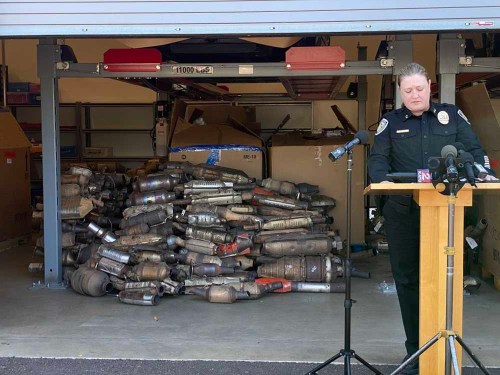Oregon catalytic converter crime ring busted, police say
Published 9:00 am Monday, August 15, 2022

- Beaverton Police Department's interim Chief Stacy Jepson speaks in front of about 1,000 catalytic converters, which were taken as evidence after a months-long investigation brought down a local crime ring that allegedly raked in millions of dollars stealing converters up and down the West Coast.
BEAVERTON — A months-long investigation by the Beaverton Police Department may have completely dismantled a local organized crime ring responsible for a large portion of catalytic converter thefts up and down the West Coast, police said Thursday, Aug. 11.
Two alleged ringleaders and at least 12 of their suspected accomplices were indicted July 29 by a Washington County grand jury on dozens of aggravated theft, racketeering and money laundering charges.
The investigation began in late 2021 when detectives said Tanner Lee Hellbusch, 32, of Beaverton, was running an illegal fencing operation by posing as a legitimate business buying and selling catalytic converters. In March, police said they pulled over Hellbusch with more than 100 stolen catalytic converters, worth about $80,000 on the black market.
Hellbusch’s arrest led detectives to the person they believe is the top of the crime enterprise: Brennan Patrick Doyle, 32, of Lake Oswego.
The investigation came to a head in late July when police searched eight locations, including a rented lakefront house in Lake Oswego, where they arrested Doyle and said they found 3,000 catalytic converters, hundreds of thousands of dollars in cash, a high-end car and jewelry.
Doyle, Hellbusch and the 12 other not-yet-publicly-named defendants are accused of trafficking more than 44,000 stolen catalytic converters with an estimated street value of more than $22 million since January.
“The defendants in this case were living a nice life,” said Officer Matt Henderson, a spokesperson for Beaverton police, at a Thursday press conference.
Police said Doyle’s organization was capitalizing on the increased price of heavy metals such as rhodium, platinum and palladium found in catalytic converters, which cleanse gas emissions and reduce pollution.
Rhodium, for example, is currently valued at over $14,000 an ounce. A standard catalytic converter has just a few grams of precious metals. While an intact catalytic converter is typically sold for $150 to $300 cash on the black market, police estimate that once the metal is extracted at a refinery, it’s worth about $800.
Because catalytic converters don’t have identifying numbers, they aren’t traceable. So it’s impossible to know how many of the recovered converters came from cars in Oregon, Henderson said.









